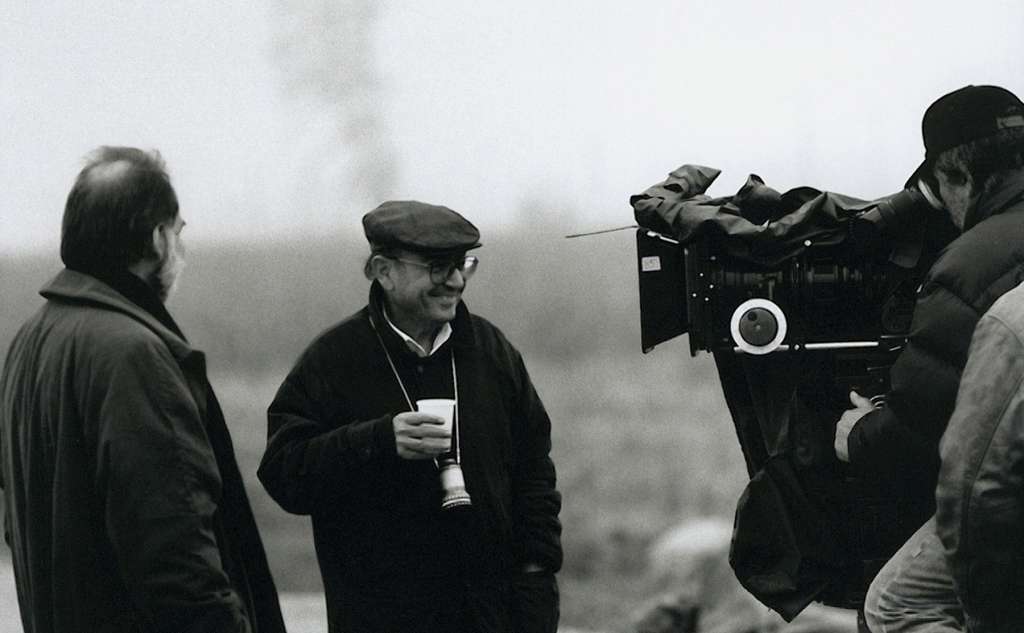Theodoros Aggelopoulos - Director

THE "POET" OF INTERNATIONAL CINEMATOGRAPHY
Theodoros Aggelopoulos was born in Athens on April 27th, 1935. From his father’s side, he comes from the village of Ampeliona, near Andritsaina of Ilia, while, from his mother side he comes from Crete. His parents came to Athens very early on and his father left Ambeliona as soon as he finished high school, at the age of 13.
Aggelopoulos is one of the best - known film directors, screenwriters and producers. In 1953, he studied law at the University of Athens but left his studies shortly before his degree. In 1961, he went to Paris to attend courses in French literature and filmmaking, ethnology and then film studies at the IDHEC School and the Musee de l'homme in Sorbonne. To meet the expenses of his studies, he worked with the sculptor Gerasimos Slavos at the reception of the Unite Universitaire. In 1964, he returned to Greece and until 1967 worked as a film critic for the “Democratic Change” newspaper. Together with Vassilis Rafailidis, he was the co-founder of “Contemporary Cinema” magazine and the first issue was released on September 1st, 1969.
He started working in the cinema industry in 1965, and in 1968 presented his first short film, entitled "Broadcast", at the Thessaloniki Film Festival. In 1970, his first film "Reenactment" won the first prize at the Thessaloniki Film Festival, which marked his beginning in modern Greek cinema. In 1979, he married producer Phoebe Economopoulou with whom they had three daughters. He met his wife during the filming of the film "Great Alexander" in which she was the production director.
Aggelopoulos has been honoured with awards inside and outside of Greece for his contribution to cinematography and has established himself as one of the most important contemporary cinema directors worldwide. He also became known for his slow pace and long shots in his films. His best-known films include: "The Troupe" (1975), "Great Alexander" (1980), "Journey to Kythera" (1984), "The Beekeeper" (1986), "Landscape in the Fog" (1988), "The Mutant Step of the Stork" (1991), "The Look of Odysseus" (1995) and "One Eternity and One Day" (1998).
Serbian director Emir Kusturica has admitted that Aggelopoulos' films were a source of inspiration for him, describing him as "a great form of the European cinema". When German director Werner Herzog watched the film "The Troupe" he was so impressed that he kissed Angelopoulos' feet. "Megalexandros" (Geat Alexander) is one of the biggest Greek films with a duration of about four hours. This film received the FIPRESCI Award at the Venice Film Festival, as well as five awards at the Cannes Film Festival in 1984. The film “Journey to Kythera” received the Screenplay Award and FIPRESCI at the Cannes Film Festival, 1984. The film “The Beekeeper” was nominated for the Golden Lion at the Venice International Film Festival. It is worth noting that a scene from the film was filmed at Andritsaina Square, (his father's place of origin), with the small restaurant where Angelopoulos’ father went to eat when he was a student.
The movie "Landscape in the Fog" received the Silver Lion for Best Direction at the Venice Film Festival, as well as the Felix Award for Best European Film in 1988. "Odysseus' Look" received the Grand Jury Prize and the Cannes Film Festival Award and the FIPRESCI award in 1995. The critics of Time magazine also voted it in the 100 best films in world cinema. The film "One Eternity and One Day" won the Golden Phoenix, the highest prize awarded to films competing at the Cannes Film Festival, as well as seven awards at the Thessaloniki Film Festival.
On January 24th, 2012, Theodoros Aggelopoulos was seriously injured during a break in the shooting of his new film "The Other Sea" in Drapetsona by a passing motorcycle. He died the same night at the hospital of Faliro where he was hospitalized. His funeral took place on January 27th at the First Cemetery of Athens. The Ministry of Culture and Tourism and the Thessaloniki Film Festival established the International Theodoros Aggelopoulos Prize in 2012 as a minimum tribute to his memory. His bust adorns the Thessaloniki Cinema Museum, while his name was given to a Thessaloniki Street, the 2nd Athens High School (where he also studied), and the theatre hall of the Florina Municipal Conservatory.



